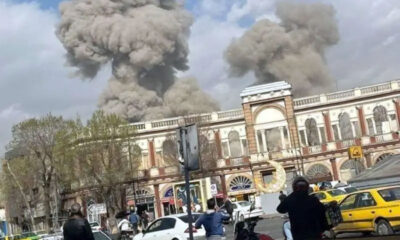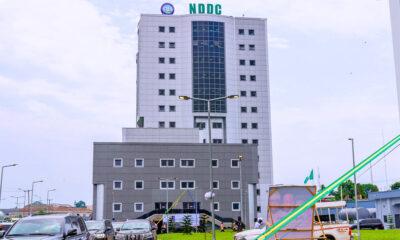Business
Host communities, CSOs reject PIB, say it will create impunity

The recent promise by the current leadership of the National Assembly to pass the Petroleum Industry Bill (PIB) in April may not be fulfilled following the rejection of the bill on Thursday by host communities and civil society groups in the Niger Delta.
In rejecting the bill, they said it was designed to further enslave oil producing communities and create confusion in the region.
Spokesperson for the CSOs and host communities in the Niger Delta, Botti Isaac, said the current PIB would not protect the host communities as it could only leave them at the mercy of the oil companies.
He also said the bill when passed and signed into law would promote confusion in the Niger Delta and further expose the communities to environmental degradation and untold hardship, adding that communities in the Niger Delta will not accept such a law.
He accused the National Assembly of not allowing a fair and adequate opportunity for vulnerable stakeholders in the region to have a say in the legislative process towards passing the PIB.
He accused the lawmakers of giving so much attention to the government and oil companies to speak on the bill.
Isaac said, “We believe that a new set of laws are necessary to govern the petroleum industry in Nigeria.
“However, the PIB’s proposals, as it is, would promote environmental impunity in the oil industry and exacerbate social dislocation in the oil-bearing communities in the Niger Delta.
“On Tuesday, January 26. 2021, representatives of oil-bearing communities and civil society organisations from the Niger Delta were denied the right to participate in so-called Public Hearings organised by the Senate.
“After dedicating the first day of the hearing to take elaborate presentations from oil company representatives and government stakeholders, the Chairman of the Committee promised to allow the presentation of host communities’ views the next day.
“Unfortunately, rather than accord the representatives of oil-bearing communities the same attention, they were denied the opportunity to speak and instead asked to ceremonially hand over copies of their memorandum to the session Chairman.
“Again, we noted a similar display at the House of Representatives Hearing where members of oil host communities were denied access to the public hearing hall.
“We consider the manner the National Assembly has handled host communities and civil society contributions in these hearings as deliberately aimed at ensuring those critical voices are not heard.
“As the Petroleum Industry Bill is critical to the functionality of the oil and gas sector and the Nigerian economy, it is of utmost importance that all stakeholders are treated equally and accorded the same opportunity to discuss its contents and proposal.
“We are also profoundly concerned about the limited number of days and hours allocated to the Public Hearings on the PIB. Each day’s session lasts between 10 am and 1 pm. On the average, only about three hours are spent on the hearings each day, amounting to only six hours of public hearings in both houses of the legislature. To say the least, this is grossly inadequate and does not indicate a commitment to aggregating and considering all views.”
He said further that while the PIB remains the oldest and perhaps the most contentious bills in Nigeria’s legislature, it has suffered several setbacks, adding that “while we support a speedy passage of the Bill, we are more interested in such bill’s content and quality.
“As currently proposed, the PIB 2020 is inadequate to address the environmental, human rights and livelihoods concerns of host communities. Proposal for a host communities development fund does not support the participation of the communities in decision making.
“The governance structures proposed for the host communities fund deliberately deny any meaningful level of community participation while overtly promoting oil companies’ control and prominence.
“Oil companies described as ‘Settlors’ in the Bill are empowered to set up the Board of Trustees of the Trusts and conduct needs assessment and produce development plans on behalf of host communities. We believe that the level of emphasis on oil companies could fuel oil industry divide-and-rule tactics and stoke communal conflicts.
“It is also important to note that environmental pollution concerns are almost entirely ignored as the Executive Bill focuses more on production and commercial viability of the industry. The PIB 2020 ‘disempowers’ federal and state environmental agencies from the monitoring and enforcement of environmental regulations in the petroleum industry.
“While Nigeria records the highest and unacceptable levels of crude oil spills globally, and the country is among the worst in gas flaring globally, the PIB 2020 fails woefully in addressing these issues. There is no clear provision for addressing environmental pollution and sanctioning polluters. The bill fails to introduce any new measures to encourage the elimination of routine gas flaring.
“A key source of contention in the PIB, at least from the point of view of host communities, is the fact that it places responsibility for the protection of pipeline and other oil infrastructures with the communities.
“According to the Bill, the host community advisory committee ‘take responsibility for first line protection of facilities and ensure that petroleum operations are uninterrupted by members of their community failing which, benefits from the trust to the host community shall be.
He argued that placing the protection of oil installations on some unarmed host communities is unrealistic as “previous researches conducted by Social Action reveals that oil theft which is the major reason for puncturing oil pipelines is carried out mainly by armed cartels who are most times not even members of the community”.
He stressed if this provisions of the law is allowed to stand, “it could result in consistent denial of benefits which could in turn engender conflicts.”
Business
TCAN Targets Logistics Reforms to Drive Economic Growth at 2026 Transport Summit

TCAN Targets Logistics Reforms to Drive Economic Growth at 2026 Transport Summit
The Transportation Correspondents Association of Nigeria (TCAN) has begun preparations for its 2026 Annual Transport Summit, placing Nigeria’s logistics value chain at the centre of national economic discourse.
Scheduled for September 2026 in Lagos, the summit will be held under the theme, “Unlocking Economic Growth Through Transportation Logistics.”
It is expected to draw major stakeholders across the aviation, maritime, rail and road transport sectors, alongside logistics service providers, policymakers, regulators, development partners and financial institutions.
In a statement, TCAN said the summit would critically examine how efficient transportation logistics can serve as a catalyst for sustainable economic growth, trade facilitation, job creation and regional integration, especially in the context of ongoing reforms and infrastructure investments within the sector.
Chairman of TCAN, Tola Adenubi, described transportation logistics as the backbone of economic development, stressing that the performance of Nigeria’s logistics ecosystem directly impacts the nation’s competitiveness.
“From cargo handling at airports and seaports to inland freight movement and last-mile delivery systems, the efficiency of Nigeria’s logistics architecture plays a decisive role in determining the competitiveness of the nation’s economy,” Adenubi said.
He noted that the 2026 summit would explore innovative strategies to strengthen the sector, including digital transformation, infrastructure financing models, public-private partnerships and regulatory reforms aimed at optimising performance.
Chairman of the 2026 Conference Committee, Suleiman Idris, said the summit would feature high-level panel discussions, keynote addresses and interactive sessions designed to assess the current state of Nigeria’s transportation logistics framework.
According to him, deliberations will focus on identifying bottlenecks hindering seamless cargo and passenger movement, examining the impact of multimodal transport integration on economic expansion, and highlighting investment opportunities within the logistics and supply chain ecosystem.
Idris added that experts at the summit would also provide policy recommendations targeted at enhancing operational efficiency and boosting Nigeria’s global competitiveness in trade and transportation.
As part of the programme, TCAN will confer its Champions of Transport Industry Development (COTID) certificates on selected government agencies and private operators that have made significant contributions to the advancement of Nigeria’s transportation sector.
Over the years, the TCAN Annual Transport Summit has evolved into a credible platform for constructive engagement between regulators, operators and other industry stakeholders.
The association said the 2026 edition aims to deepen policy conversations, promote transparency and accountability, and accelerate reforms capable of unlocking the full economic potential of Nigeria’s transport and logistics industry.
With logistics increasingly recognised as a key enabler of economic growth, industry observers expect the 2026 summit to set the tone for fresh strategies that could reshape Nigeria’s transportation landscape in the years ahead.
Business
Petrol Jumps to ₦937 in Lagos, ₦975 in Abuja Amid Middle East Oil Crisis

Petrol Jumps to ₦937 in Lagos, ₦975 in Abuja Amid Middle East Oil Crisis
Nigeria’s fuel market is under renewed strain as escalating tensions in the Middle East push global crude oil prices above $80 per barrel, driving domestic petrol prices toward the ₦1,000 per litre mark. Motorists across the country, from Lagos to Abuja, have woken to sharp increases at filling stations, with pump prices rising almost overnight.
In Lagos, several outlets raised the price of Premium Motor Spirit (PMS) from ₦830–₦835 per litre to ₦937, while in the Federal Capital Territory, major retailers including NNPC Limited and MRS Oil Nigeria Plc increased prices from ₦875 to ₦975 per litre. Independent marketers were dispensing fuel at about ₦960 per litre, reflecting the immediate effects of rising international oil prices.
The surge followed a fresh upward review in the ex-depot price by Dangote Petroleum Refinery & Petrochemicals, which moved its gantry price from ₦774 to approximately ₦874–₦875 per litre. Industry insiders linked the hike to rising replacement costs and the ongoing surge in crude prices. A senior refinery official confirmed that petrol loading operations were temporarily suspended earlier in the week, further tightening supply expectations and accelerating retail price adjustments.
READ ALSO:
- US Military Says It Has Struck Nearly 2,000 Targets in Iran as War Escalates
- FG Bans Roadblocks, Cash Tax Collection Nationwide
- Trade Row Looms as Trump Threatens Spain After Refusal to Support Iran Strikes
The Middle East conflict, particularly involving the United States, Israel, and Iran, has heightened fears of disruption around the Strait of Hormuz, a strategic maritime route responsible for nearly one-fifth of global crude supply. Analysts warn that prolonged instability in the corridor could push global oil prices to $100 per barrel or higher, with direct consequences for Nigeria’s cost-reflective petrol pricing system.
The Petroleum Products Retail Outlets Owners Association of Nigeria (PETROAN) described the situation as worrisome, noting that rising crude prices inevitably feed into domestic pump prices, given the current deregulated pricing regime. PETROAN’s National President, Mr Billy Gillis-Harry, emphasized the urgent need to strengthen Nigeria’s domestic refining capacity as a protective buffer. The association also called for consistent crude supply to local refineries and accelerated rehabilitation of the country’s four state-owned refineries to cushion the economy against external shocks.
For Nigerians, the impact has been immediate. Commercial drivers and commuters report that rising fuel costs are forcing them to adjust transport fares, adding pressure to household budgets. “I bought fuel yesterday at ₦875, and this morning it is ₦975. Every increase affects us directly. If we don’t raise fares, we run at a loss,” said Mr. Chinedu Okeke, a driver in Abuja.
Commuters fear the ripple effect of higher petrol costs on everyday goods. “If fuel is almost ₦1,000 per litre, it means fares and prices of essentials will rise. Things are becoming unbearable,” said Mrs. Aisha Ladan, a civil servant in the capital city. Analysts warn that increased transport costs could widen inflationary pressures, as businesses pass on higher operational expenses to consumers.
The psychological impact of petrol nearing the four-digit mark is also significant. For many Nigerians, it represents another milestone in a period already marked by subsidy removal, currency volatility, and persistent price adjustments. Unless global energy markets stabilize or domestic refining capacity is expanded, petrol prices in Nigeria may soon cross ₦1,000 per litre, with broad implications for the economy.
Petrol Jumps to ₦937 in Lagos, ₦975 in Abuja Amid Middle East Oil Crisis
Business
FG Bans Roadblocks, Cash Tax Collection Nationwide

FG Bans Roadblocks, Cash Tax Collection Nationwide
The Federal Government of Nigeria has officially banned the mounting of roadblocks and the collection of taxes in cash nationwide, in a decisive move to modernise the country’s tax system, enhance transparency, and streamline revenue collection across federal, state, and local governments.
The announcement was made in Abuja by Mr Olusegun Adesokan, Executive Secretary of the Joint Revenue Board, during the signing of the Presumptive Tax Regulations and Implementation Guidelines. Adesokan said the new rules are designed to eliminate informal, coercive, and fragmented tax practices, particularly in the informal sector, and promote fairness and equity in tax administration.
“All forms of cash tax collection by authorities are now prohibited, alongside the use of roadblocks for revenue enforcement,” Adesokan explained, stressing that these reforms signal a nationwide shift toward technology-driven tax collection systems.
READ ALSO:
- Trade Row Looms as Trump Threatens Spain After Refusal to Support Iran Strikes
- UK, France Deploy Warships, Anti‑Drone Helicopters to Cyprus After RAF Akrotiri Strike
- NRC Expands Abuja–Kaduna Train Service with Additional Trips
Under the regulations, nano and small businesses with an annual turnover of ₦12 million or less are exempt from taxation, while other informal businesses are subject to a 1% tax on turnover. The reforms encourage the use of digital payments and the integration of operators into the formal economy through a Tax Identification Number (TIN) platform, ensuring uniform tax administration across states.
The Minister of Finance and Coordinating Minister of the Economy, Wale Edun, described the move as a shift from legislative approval of Nigeria’s 2025–2026 tax reforms to full implementation. Edun emphasised that the framework does not raise tax rates but broadens the tax base, prevents arbitrary assessments, protects small businesses, and supports economic growth.
Mr Joseph Tegbe, Chairman of the National Tax Policy Implementation Committee, said the reforms aim to restore order and replace arbitrary practices with transparency. He highlighted that the informal sector employs over 80% of Nigeria’s workforce, yet its contribution to structured public revenue remains low. The guidelines are intended to encourage compliance while strengthening revenue mobilisation for public services.
The ban on roadblocks, a longstanding method for informal tax enforcement, is expected to reduce harassment of traders and motorists, improve ease of doing business, and foster trust in government tax authorities. Observers say the shift to cashless, digital tax collection will curb corruption, enhance efficiency, and integrate informal operators into the formal economy.
FG Bans Roadblocks, Cash Tax Collection Nationwide
-

 International2 days ago
International2 days agoIran Retaliates: Gulf States Allied With US Hit by Missiles, Drones
-

 International2 days ago
International2 days agoSaudi Arabia Denies Lobbying US to Strike Iran as Gulf States Respond to Escalation
-

 International2 days ago
International2 days agoSeveral U.S. Warplanes Crash in Kuwait Amid Ongoing Iranian Strikes
-

 metro2 days ago
metro2 days agoDaddy Freeze Warns Couples Over 40: ‘Avoid Moving Abroad, Especially US, UK’
-

 International2 days ago
International2 days agoIsraeli Airstrikes Kill 31 in Lebanon as Hezbollah Loses Senior Figures
-

 Politics2 days ago
Politics2 days agoWike Blasts Kingibe Over FCT Council Election Remarks
-

 metro3 days ago
metro3 days agoLagos Announces Traffic Diversions for Ogunnusi Road Reconstruction in Ikeja
-

 Health2 days ago
Health2 days agoNigeria to Receive Breakthrough HIV Prevention Drug This Month – NACA
















You must be logged in to post a comment Login